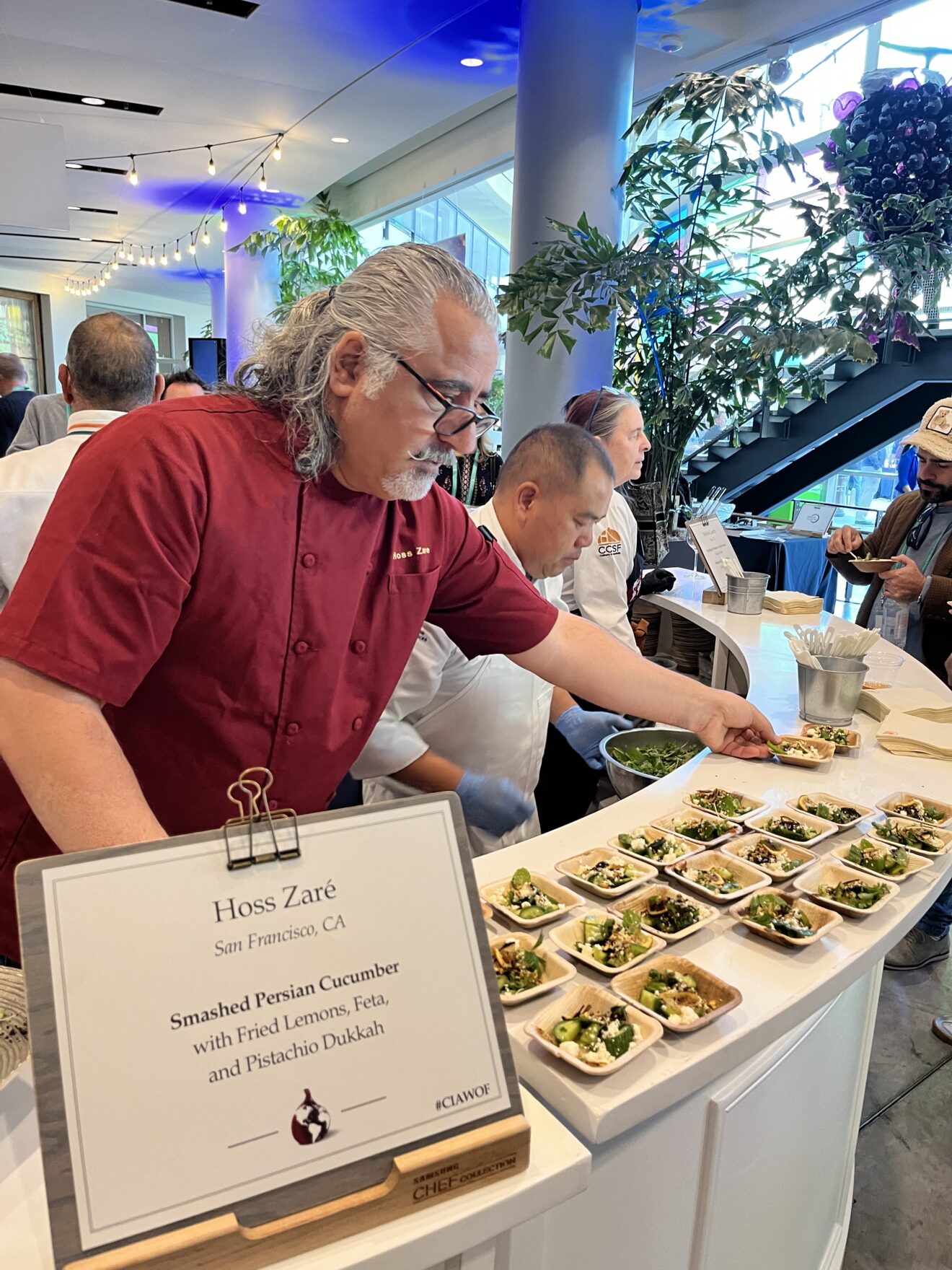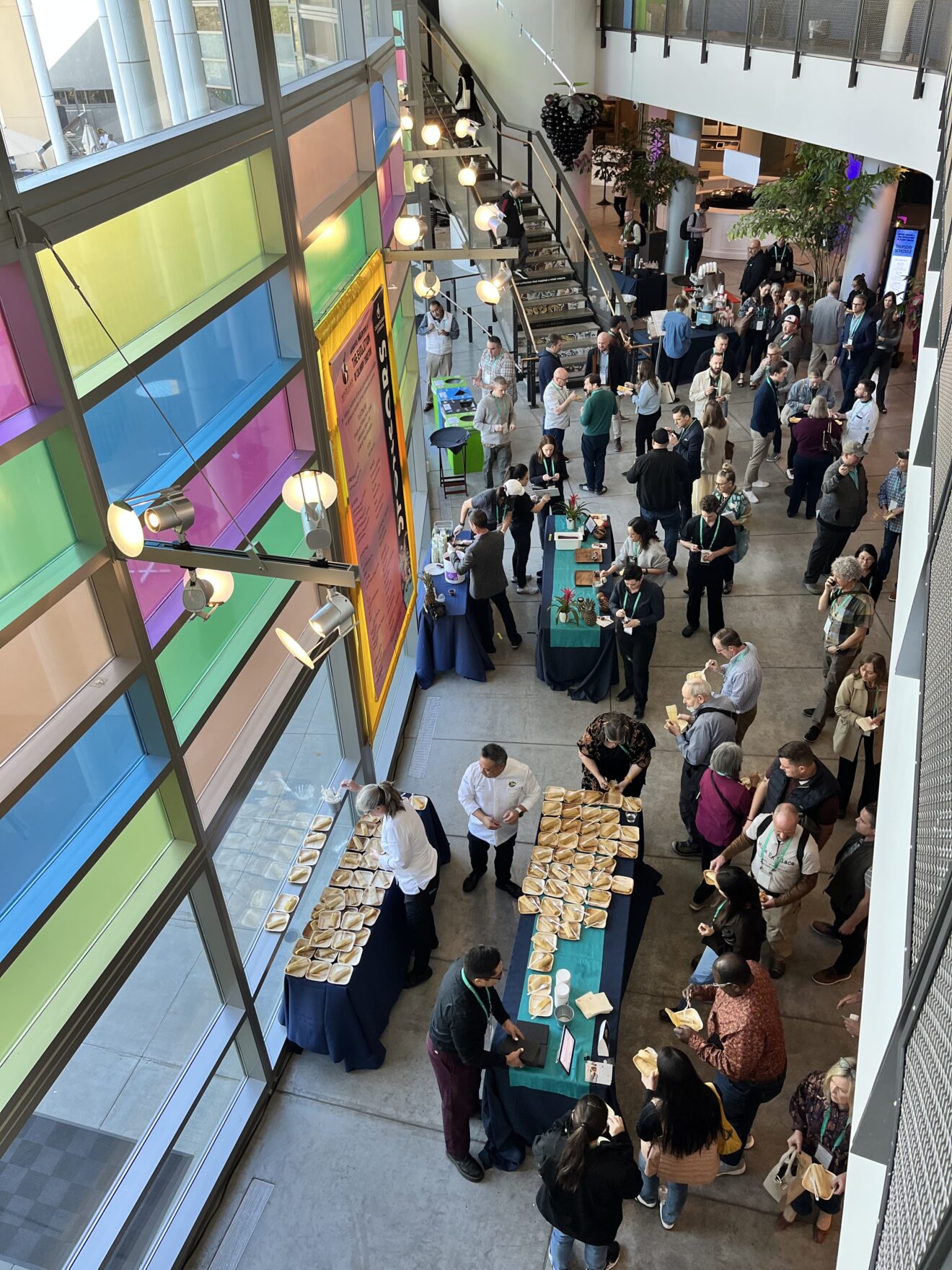The scent of sauces and spices from across the globe filled the air at The Culinary Insitute of America at Copia’s campus this year during its 26th annual Worlds of Flavors conference in Napa, Calif. Chefs and culinary experts from every corner of the world — Mexico, Turkey, Poland, the UK, Korea, the US and beyond — gathered to exchange knowledge, celebrate diverse food cultures and reflect on how migration and society as it is today are reshaping the future of world cuisines.
This year’s theme, Borders, Migration, and the Evolution of Culinary Tradition, carried deep political and cultural significance, highlighting the interconnectedness of food across borders. As the world grows more interconnected, chefs are increasingly challenged to reflect the nuances of migration, blending ingredients, techniques and traditions in ways that tell the story of the people who carry them. Throughout the week, the conference underscored the importance of understanding the historical contexts of dishes, and how food, much like people, evolves and adapts through cultural exchange.
The significance of cultural significance

A diverse roster of guest chefs shared their insights into how food can unite and inspire, with presentations on topics ranging from the cultural significance of specific ingredients to the ways in which social media has democratized culinary knowledge, enabling the rapid exchange of food traditions across the globe. But it was the shared themes of migration, tradition and connection that resonated most deeply, offering a powerful lens through which to view the evolution of food.
During the last session of the conference, Giselle Kennedy Lord, a digital storyteller and author from Portland, Ore., explored how the interconnectedness of global cuisines reflects the stories of migration and blending of cultures. Drawing on examples like lavash — a Lebanese flatbread — and the evolution of shawarma into tacos al pastor, she illustrated the innate influence of migration on culinary practices.
“Food doesn’t just nourish the body; it nourishes the soul, it tells stories,” Lord said, who has Lebanese roots. Her session emphasized that while we must respect and preserve the heritage of traditional dishes, we must also embrace their evolution. For Lord, culinary evolution is not just about adapting to new ingredients or trends, but about continuing the stories that food has told for generations.
“What do Caribbean people do with the fish pepper? Let that be the driver of what you’re going to do with the fish pepper,” Lord posited. Her message was clear: Be bold, be respectful, and above all, tell your story through the food you cook.
Serving communities through culinary education and empowerment was discussed in one of the concurrent seminars that took place in a room filled with chefs dedicated to that work. Chef Dan Giusti, founder and head chef at Brigaid, a nonprofit organization dedicated to expanding professional chef services in school food programs, spoke passionately about how chefs can make a real difference in underserved communities. Similarly, chef Alexander Harris from Emma’s Torch discussed his work in training refugees in culinary skills, emphasizing the importance of cultural respect in this work. Their efforts are part of a larger movement within the food industry to prioritize worker well-being, equity and social impact.

The concept of “mestizaje” — the blending of cultures — was also brought up by Saqib Keval and Norma Listman, chef-owners, Masala y Maiz Group in Mexico City, as Listman critiqued the term “fusion” as a superficial, often capitalist “gimmick.” Instead, she proposed “mestizaje” as a more accurate and respectful term for cultural blending, one that honors the histories and people behind the food. The conversation highlighted how, in the wake of mass migration and cultural exchange, the evolution of food is not just about new ingredients or techniques but about respecting and acknowledging the people and traditions that shape those changes.
Hoss Zaré, lead operational training executive chef, Bon Appétit Management Company at Google, Mountain View, Calif., put it simply in a separate session: “Food for me is bringing people together. We are social beings, we eat together – food is connection for humanity.”
On making the old new

The conference was also a showcase of how food is evolving in response to global challenges. As chefs and food leaders from diverse regions discussed their work, from introducing young people to culinary careers to promoting sustainable, multiproduct farming, the importance of supporting small-scale producers and preserving cultural culinary heritage was spotlighted. These discussions reinforced the idea that the future of food depends on diversifying the food system, creating opportunities for small farmers and integrating traditional ingredients into modern markets.
A session that featured Ebru Baybara Demir, social gastronomy chef and entrepreneur, From Soil to Plate Agricultural Development Cooperative, Mardin, Turkey, and Pierre Thiam, chef-owner, Teranga, and founder, Yolélé; Oakland, Calif., explored the culinary practices of Turkey and West Africa, particularly focusing on ancient crops, like fonio, that are not only flavorful but also nutrient-dense and climate-resilient. The conversation delved into the intricacies of Turkish and West African cuisines, exploring how spices like sumac in Turkish cooking and fermented seeds in West African dishes create unique umami flavors. As climate change continues to impact agriculture, these traditional ingredients offer a sustainable alternative to more conventional crops.
Chef Alexander Baron, co-owner of Kapłony I Szczeżuje in Krakow, Poland, and Chef Tomas Skowronski of Apteka in Pittsburgh, Pa., discussed the evolution of Polish food and how they are working to preserve and innovate within their native cuisines. Barron highlighted the importance of fermentation techniques and the use of local ingredients, showcasing a traditional Polish soup, zurek. Skowronski, meanwhile, demonstrated how vegan dishes can honor Polish culinary traditions while adapting to modern dietary preferences. Together, they illustrated how modern chefs can honor their culinary roots while embracing innovation.
As Lord put it, cooking the food you know and love and making space for others to do the same is what will propel us “forward into a food tradition for a new generation.”
Ultimately, Worlds of Flavors 2024 was more than just a celebration of food — it was a call to action for chefs and culinary professionals everywhere to understand the power of food as a force for change. Speakers and chefs carried the message that the evolving landscape of global cuisine is not just about blending ingredients, but about respecting and preserving the stories, cultures and histories that shape those dishes. Through migration, culinary traditions evolve, but in their evolution, they also tell the story of a world that is increasingly interconnected, curious and open to the flavors of the future.
“We are always a new generation, and every single new generation has moved us forward in some way,” said Lord. “And now, because we are so beautifully mixed and so beautifully influenced by others, and the information comes at us from far away very quickly, there’s so much we can do with this.”
Recent related stories:
- Diverse voices and viewpoints add flavor to food trend forecasts
- Why sea moss is gaining popularity as a versatile superfood
- Q&A: How cultural blending, migration are reshaping culinary traditions
_____________________________________
If you liked this article, sign up to receive one of SmartBrief’s Food & Beverage newsletters. They are among SmartBrief’s more than 250 industry-focused newsletters.
